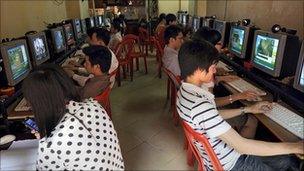Vietnam's bid to tame the internet boom
- Published

Vietnam is one of the fastest growing economies in Asia, spurred by a policy of rapid liberalisation in the Communist state.
Shops are packed with the latest designs, from watches to iPads and MP3 players.
The country is opening up to the outside world - and that presents a challenge to the authorities.
Nowhere is that more clear than over the use of the internet.
More than a third of Vietnam's young population now regularly goes online.
Almost every cafe in central Hanoi, it seems, offers free WiFi.
Safeguard or censorship?
I met Minh, a 26-year-old lawyer, and Ngan, who has just graduated from university, at one of their favourite haunts.
Minh was surfing the internet on his iPhone and Ngan was checking Facebook on her laptop.
"Whenever I have free time I often come here to surf the internet and hang out with my friends," Ngan told me over a cup of Vietnam's famous coffee.
The government has responded to the internet boom with a new law obliging any place that provides public access to the internet - cafes, hotels, businesses - to install monitoring software.
The law, announced in April, will enable the authorities to track who is doing what online, and that worries Minh and Ngan.
"Sure, there are some bad websites and malicious information on the web," Minh said. "But on the other hand, if they overdo it, then it will be like restricting access to information for Vietnamese people."
Human rights groups, including Viettan and Reporters Without Borders, say that is precisely what the government is trying to do.
The new regulations, they say, amount to state censorship.
The government says it is simply trying to safeguard the vulnerable.
"These regulations are necessary to protect the people from the negative effects of the internet, first of all, and to protect our society," foreign ministry spokeswoman Nguyen Phuong Nga said.
But a recent report from Human Rights Watch alleged that the Vietnamese government was deliberately targeting independent bloggers.
"That's not true," Ms Nga said.
"In Vietnam we have more than a million bloggers. Bloggers are not arrested because of the expression of their opinions. Only those who break the law are dealt with according to the law."
Same problems
An awful lot of political dissidents seem to fall into that category.
It is not blogging as such that causes the problem, rather it is the choice of subjects that can land someone in jail.
Writing about corruption, religious freedom, land seizures, or unpopular government deals with China can result in an unwanted knock on the door from the police.
Le Thi Cong Nhan is a prominent human rights lawyer, who has openly campaigned for multiparty democracy, often using the internet to get her message out.
She was sentenced in 2007 to three years in prison for "spreading propaganda against the state".
Now she is under house arrest.
But despite the potential risk, Le Thi Cong Nhan agreed to meet me, under cover of dark, and on condition that I was able to lose my government-appointed minder.
Ms Nhan's internet connection has been cut off, but somehow she still manages to use email, although she would not tell me how.
Internet censorship, she told me, is just a new version of an old problem.
"The most basic thing in human rights is freedom of speech," she said emphatically. "We can have nothing if we don't have freedom of speech."
The internet it seems is helping to fuel that demand, in part because controlling the flow of information on the web is increasingly difficult.
Inevitably perhaps, the tension between a centralised state and a globalised world is growing.